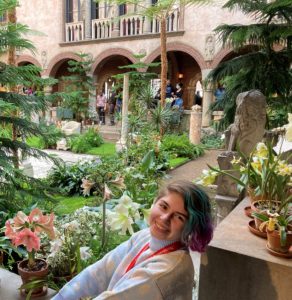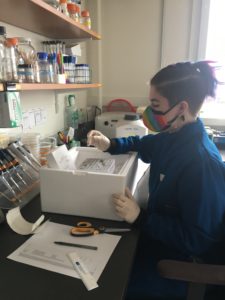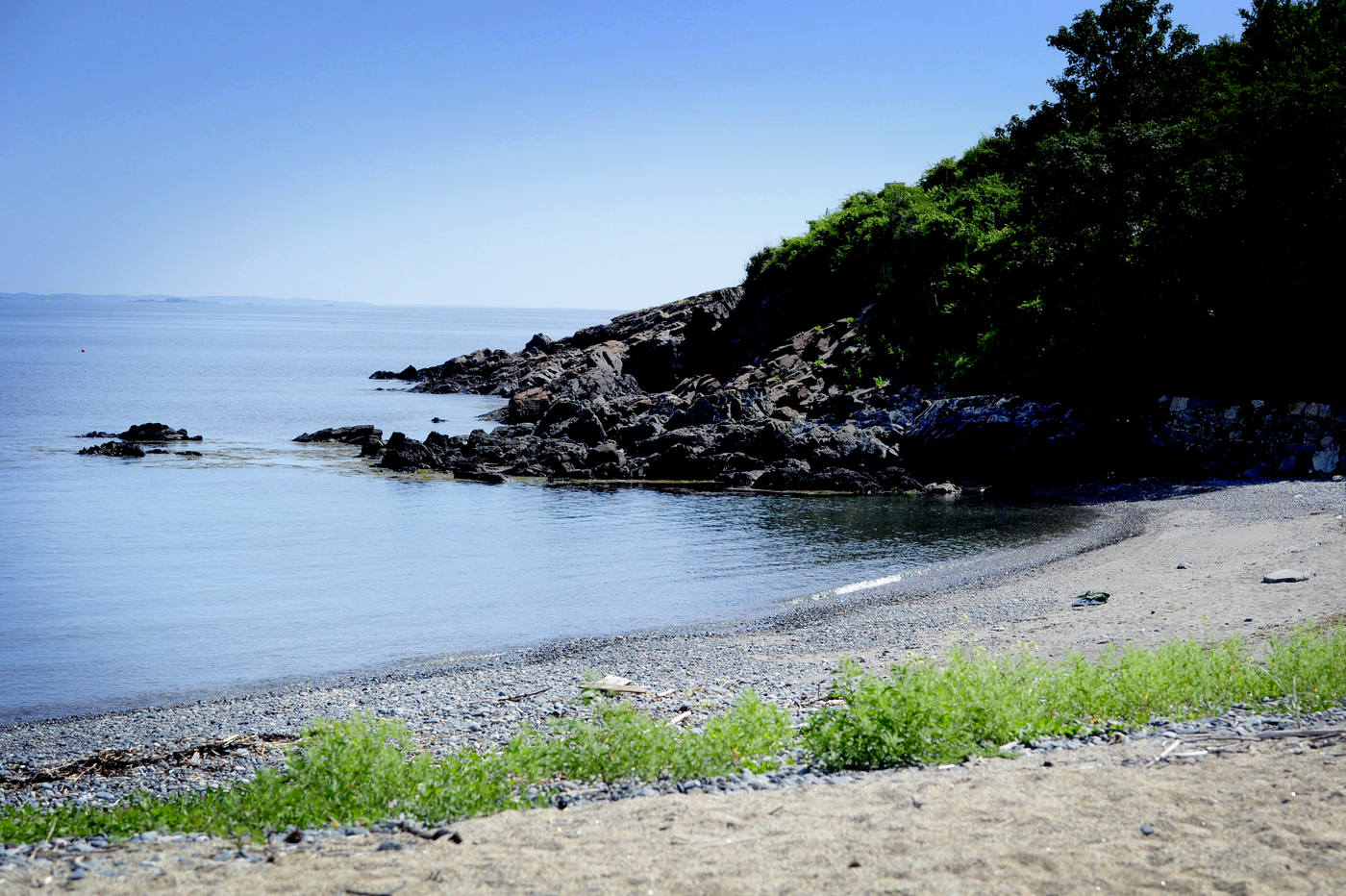Kira Becker and Lee Fenuccio recently completed a co-op at the Ocean Genome Legacy Center (OGL). They are taking over our Instagram the week of June 27 to reflect on their experience. Follow along!
Lee Fenuccio, BS in Ecology ‘24

Q: Why did you decide to pursue studies in ecology?
I applied to Northeastern University because I was interested in the biology program but learned about the ecology major early in my first year and switched to it. I care deeply about the environment and the organisms within it, so ecology was the perfect major to explore my interests in the natural world, ecosystems, and conservation.
Q: Tell us why you declared a minor in data science.
Data science is becoming more prominent in many fields, including ecology and conservation biology. There is an abundance of already collected data that, if analyzed properly, can teach us important things about the world. I want to develop my coding skills and be able to view ecological questions through the lens of a data scientist, which will hopefully lead to future discoveries.
Q: How did you learn about the OGL co-op position? Why did you decide to work here?
I found this co-op using NUWorks. I accepted the offer because of its alignment with my interests in ecology and data science. In addition, I knew the role would include working with different data about various organisms.
Q: How did Northeastern courses, professors, or other resources prepare you to pursue this co-op?
My required co-op class prepared me for this role. In addition, Advanced Writing in the Environmental Sciences prepared me for the kinds of scientific reading and writing I did. Introduction to Environmental, Social, and Biological Data prepared me to work with large amounts of data too.

Q: Tell us about your experience at this co-op.
I really enjoyed the co-op. I had the opportunity to work with samples from very cool and unique specimens, including icefish from the Antarctic. These fish are unique because some do not have hemoglobin in their blood. I also worked with many specimens from hydrothermal vents found in the Gulf of Mexico, which are ecosystems that seem alien-like because they function much differently than the ones we know. Some of the data work was tedious, but that was to be expected. If anything, it has taught me the importance of taking notes and formatting data in ways others can understand and use.
Q: How has this experience informed your future career aspirations?
This co-op has solidified my interest in ecology and conservation, and I’ve learned a lot about potential future careers. I enjoy working in the lab and the field, and I would like a job that combines both.
Q: What advice would you give to students interested in similar co-ops?
Don’t get tunnel vision for just one thing you’re interested in; open yourself up to experiencing things you might not have been initially interested in, and you might enjoy them too.
Q: Tell us about your experience in the Wildlife Club.
I joined the Wildlife club during my first year at Northeastern. It’s a great space where students of all majors and backgrounds can bond over our love of nature and the wacky world of animals. I’m currently serving as president, which is a big responsibility because the club is very young, and I’m only the third president. I’m working hard to make the club a welcoming environment featuring activities everyone can enjoy for years to come.
Q: How did you become a volunteer for EcoTarium? Tell us more about this experience. Why is this something you are passionate about?
My interest in science and nature started at a young age when I visited a local nature museum and zoo called the EcoTarium located in Worcester, MA. As I grew up, I visited more often, eventually becoming a volunteer and an employee. I feel deeply connected to the museum because it’s where I first discovered my love of science and why I decided to pursue it. As a volunteer and employee, I help keep the museum running so future generations can have the same experiences I had when I was younger. Hopefully, I can inspire others to pick up that same love of science and nature.
Kira Becker, BS in Ecology and Evolutionary Biology ’24
Q: What is your major and predicted graduation year?
My major is Ecology and Evolutionary Biology, and I will graduate in 2024 on a five-year track doing three co-ops.
Q: How did you learn about the OGL co-op position?
At the start of this semester, I was in a strange situation because I had accepted a global co-op in Tel Aviv, Israel, and was prepared to travel there before Omicron hit. Unfortunately, the pandemic shut down the local consular offices and prevented my visa from going through. As I was desperately making backup plans for my housing situation in Boston in late January, my advisor let me know that this co-op position had not yet been filled and that I would be a good fit.
This offer really saved me, as I was not only able to proceed with doing a co-op this semester, but this position also checked a lot of my boxes in terms of what I was looking for in a second co-op: primarily labwork in genetics/genomics, in-person, paid, and commutable.
In addition, I’ve been connected to Northeastern’s Marine Science Center since high school through local programs. I volunteered briefly during my first and second years here, so I was familiar with the lab and community. Had I been looking for co-ops in Boston, I would have definitely applied to this co-op from the beginning for these reasons.
Q: How did Northeastern courses, professors, or other resources prepare you to pursue this co-op?
This co-op involves a lot of lab and technical DNA-related work. My most recent DNA lab experience was in a course taught by Professor Jen Bowen, where we did a project extracting and sequencing DNA from supermarket fish. I learned a lot from that course, which helped prepare me for this position.
Q: Tell us about your experience at this co-op.
The Marine Science Center is in a fantastic location, with ocean views, a shuttle connection to campus, and a friendly, helpful community of marine and environmental scientists carrying out fascinating and important research. The OGL is a marine biorepository, a sort of archive for DNA collected from marine animals worldwide. As a co-op, I’m researched preservatives that can be used to prevent DNA from degrading when it is stored in the long term, keeping OGL collections fresh and intact for years.
Q: How has this experience informed your future career aspirations?
I enjoy lab work and research, and genetics is a topic I’m interested in too. I really like marine biology, too, and I’d love to continue working with marine animals and be as close to the ocean as possible.
Q: What advice would you give to students interested in similar co-ops?
Read as much as you can about the topic you’re researching and the techniques you’re using in the lab because the better you understand what you’re doing, the better you’ll be at your work and solving problems that you will experience!
Follow us on Instagram, @northeasterncos!

